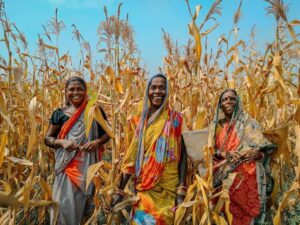Physical Address
23,24,25 & 26, 2nd Floor, Software Technology Park India, Opp: Garware Stadium,MIDC, Chikalthana, Aurangabad, Maharashtra – 431001 India
Physical Address
23,24,25 & 26, 2nd Floor, Software Technology Park India, Opp: Garware Stadium,MIDC, Chikalthana, Aurangabad, Maharashtra – 431001 India

A new report presented at COP29 has called for India to implement a comprehensive, gender-responsive climate finance strategy, asserting that current policies remain fragmented and fail to support women as leaders in climate resilience fully. The report, authored by Chase India in collaboration with Global Counsel, highlights critical gaps in India’s climate approach and urges coordinated action to empower women in the fight against climate change.
Despite significant progress in gender-focused initiatives, such as the Pradhan Mantri Ujjwala Yojana, which has provided over 103 million rural women with access to clean cooking fuel, and the National Rural Livelihoods Mission, which has mobilized millions of women in sustainable livelihoods, these policies are often fragmented and lack the necessary coordination between ministries. As a result, their full potential remains untapped, and women are still largely seen as passive beneficiaries rather than central agents of climate resilience.
The report emphasizes that India’s national climate policy does not yet feature a unified, gender-responsive climate finance strategy. “Despite these efforts, the impact of such policies often remains fragmented due to various ministries working in silos, and India’s national climate policy still lacks a consolidated, gender-responsive climate finance strategy that could more comprehensively support women as climate leaders,” the report states.
Gender Gaps in Climate Policy
The report points out that existing gender-focused policies, like the draft National Policy for Women 2016, do not sufficiently integrate climate concerns. While the policy aims to address gender issues during migration and displacement caused by climate change, it operates independently of broader climate initiatives, limiting its effectiveness. The report also highlights that, while there are opportunities for women through various Missions under the National Action Plan on Climate Change (NAPCC), there are limited mechanisms for targeted climate finance to support women-led green initiatives or women entrepreneurs in climate-sensitive sectors.
India’s decentralized regulatory structure, however, provides an opportunity to build gender-responsive strategies into State Action Plans for Climate Change. The report underscores the potential for state-level actions to support women in climate adaptation efforts if coordinated properly with national policy.
Recommendations for Action
To bridge these gaps, the report offers a series of recommendations. It suggests creating dedicated climate finance funds specifically for women-led initiatives in climate-sensitive sectors, such as green technology and low-carbon projects. Additionally, the report advocates for grassroots financial literacy programs to help rural women connect with the resources they need to actively participate in climate adaptation efforts.
Women in India, who comprise nearly half of the population and play crucial roles in resource management, continue to face systemic financial barriers that restrict their ability to respond effectively to climate impacts. The report calls for a complete overhaul of existing frameworks to ensure gender-specific challenges are integrated into climate policies. It also recommends conducting gender assessments during policy planning stages to better understand women’s needs and design supportive climate policies.
The report further proposes fiscal incentives for companies adopting gender-inclusive sustainability practices, such as tax credits for organizations with gender-focused climate initiatives. This could help mobilize the private sector to play a more significant role in gender-responsive climate finance.
Regional and Global Implications
Extending its analysis to South Asia, the report highlights the broader regional challenge of socio-economic and financial inequalities faced by women in the face of climate impacts like droughts and floods. By integrating women into climate finance frameworks, South Asia could unlock significant socio-economic benefits, positioning women as key leaders in climate resilience efforts.
The report advocates for a “Price and Policy” approach to create a gender-responsive financial system. This includes recognizing the economic burdens women face in climate-affected regions and introducing targeted solutions, such as concessional loans, subsidies, and insurance products tailored to women-led enterprises in low-carbon sectors. It also emphasizes the need for social protection programs, including climate-smart grants and disaster recovery loans, to stabilize economic conditions for vulnerable populations during climate shocks.
To ensure the success of these recommendations, the report stresses the importance of ecosystem enablers such as capacity building for government officials, NGOs, and financial institutions. Strengthening partnerships with women-led organizations, the private sector, and local governments will also be critical to channeling financial resources and technical expertise directly to grassroots levels, where they can have the most significant impact.
India, as the largest and most diverse country in South Asia, is uniquely positioned to lead the region’s shift toward gender-responsive climate finance. By establishing a cohesive, gender-focused climate policy framework, the report suggests that India can set a regional benchmark, driving inclusive and sustainable climate solutions across the subcontinent.
Suryaprabha Sadasivan, Senior Vice President at Chase India, underscored the urgency of the moment. “With 80% of climate-displaced people being women and girls, they face both environmental devastation and economic insecurity without adequate financial support. COP29, with its focus on climate finance, offers a critical moment to change this. Our report calls for gender-responsive frameworks that position women as leaders in resilience. By bridging these financial gaps, we can transform women’s vulnerability into powerful leadership for a sustainable future,” she said.
References:
https://www.ptinews.com/story/national/despite-progress-in-gender-focused-policies-fragmented-response-in-india-limits-support-for-women-as-climate-leaders-report/1984858
https://www.hindustantimes.com/ht-insight/climate-change/why-india-must-prioritise-women-in-climate-action-101726473084288.html
https://www.niti.gov.in/sites/default/files/2023-02/CEEW-Roadmap_for_Access_to_Clean_Cooking_Energy_in_India-Report.pdf
https://unfccc.int/files/gender_and_climate_change/application/pdf/egmreport.pdf
Banner Image: Soubhagya Maharana on Pexels